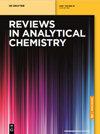简要综述了包装吸附剂微萃取法在生物、食品和环境样品中抗生素分析中的应用
IF 3.8
3区 化学
Q2 CHEMISTRY, ANALYTICAL
引用次数: 0
摘要
目前,样品制备是分析过程中最费力的部分,需要最多的时间,容易产生最多的错误。在这种情况下,许多调查都集中在这些技术的小型化上,以减少工作时间、成本和错误。在这方面,填充吸附剂微萃取(MEPS)是一种简单、快速、可靠的样品制备技术,适用于多种分析系统的自动化,适用于各种样品。抗生素是最常用的药物之一;然而,它们的广泛和不当使用引起了环境、人类健康和食品安全方面的重大关注。这篇简短的综述旨在提供最近报道的基于MEPS的抗生素提取方法的概述,特别关注那些应用于生物,环境和食品样品分析的方法。此外,强调了MEPS设备提取前的样品预处理步骤,以及MEPS过程中样品相关步骤的描述,如提取、洗涤和洗脱。本文章由计算机程序翻译,如有差异,请以英文原文为准。
A brief review of the application of microextraction by packed sorbent for antibiotics analysis from biological, food, and environmental samples
Abstract Currently, sample preparation is the most laborious part of the analytical process, requiring the most time and being susceptible to the most errors. In this context, numerous investigations have focused on the miniaturization of these techniques to reduce work time, costs, and errors. In this regard, microextraction by packed sorbent (MEPS) is a simple, fast, and robust sample preparation technique suitable for easy automation in several analytical systems and is applied to a wide variety of samples. Antibiotics are among the most commonly used drugs; however, their extensive and inappropriate use has garnered significant attention in the environment, human health, and food safety. This brief review is intended to provide an overview of recently reported antibiotic extraction methods based on MEPS, with a special interest in those applied to the analysis of biological, environmental, and food samples. In addition, the sample pretreatment step before extraction by the MEPS device was highlighted, as was the description of the sample-related steps within the MEPS procedure, such as extraction, washing, and elution.
求助全文
通过发布文献求助,成功后即可免费获取论文全文。
去求助
来源期刊

Reviews in Analytical Chemistry
化学-分析化学
CiteScore
7.50
自引率
0.00%
发文量
15
审稿时长
>12 weeks
期刊介绍:
Reviews in Analytical Chemistry publishes authoritative reviews by leading experts in the dynamic field of chemical analysis. The subjects can encompass all branches of modern analytical chemistry such as spectroscopy, chromatography, mass spectrometry, electrochemistry and trace analysis and their applications to areas such as environmental control, pharmaceutical industry, automation and other relevant areas. Review articles bring the expert up to date in a concise manner and provide researchers an overview of new techniques and methods.
 求助内容:
求助内容: 应助结果提醒方式:
应助结果提醒方式:


